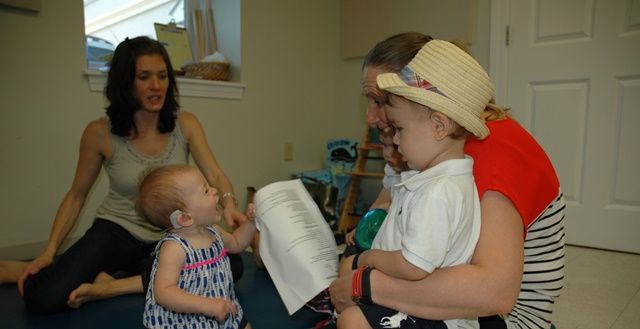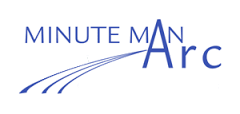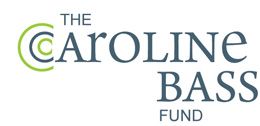Family-Center Early Intervention for Children with Hearing Loss

Mothers and children learning sign language together in the Infant Group at Minute Man Arc.
The Decibels Foundation was founded on the belief that the parents and caregivers of children with hearing loss need as much support, education, and resources as their children. Ninety-five perfect of children with hearing loss are born to hearing parents who have no experience with hearing loss. Fully supported families are essential to the long-term success of a child with hearing loss. For this reason we support a family-centered approach to hearing loss programs that are designed to provide parallel education and support to the child and the parent.
Parent Resources
There is an abundance of resources available for children with hearing loss and their families. So much so, it can be very overwhelming. Here we have selected some of our favorite resources for parents and caregivers of children with hearing loss!
Boston Children's Hospital
The Decibels Foundation is a proud supporter of the Caroline Bass Fund which supports the following hearing loss related programs at Boston Children's Hospital. All of the following programs are limted to parents of Boston Children's Hospital.
-
Hearing Loss Parent Group Meetings
Parent group meetings are held at Children's Hospital Waltham campus on evenings and Saturdays. Parents of children of any age or degree of hearing loss are invited to meet other parents, share refreshments, and listen to informational presentations. Child care is provided by student interns.
-
Hearing Aid Handbook
The Audiology staff at Children's Hosptial developed a spiral-bound Hearing Aid Handbook which provides parent-friendly instructions and illustrations showing how to operate a child's hearing aids. This handbook is given free of charge to families who are fitted with hearing aids through the Sound Start hearing aid loan program.
-
Cochlear Implant Informational DVD Series
Audiologists explain the operation and benefits of cochlear implantation in a family-friendly, non-commercial, manner, augmented by video clips of children listening with their implants in the context of their family life and school. Further DVDs on surgery and follow-up are planned. An earlier DVD, created with the support of the Caroline Bass Fund, called A Sound Decision, continues to be a popular way for adolescents contemplating cochlear implantation to learn about this option from other young teens who share their experiences.
-
Cochlear Implant "Going to the Hospital" Backpack
Each child who enters Children's Hospital in Boston for cochlear implant surgery is well prepared with a backpack of activities and age-appropriate comforts. The team psychologists use the items in the backpack to help the child address anxieties prior to the surgery.
-
Transition to College Teen Group
Evening meetings for teens with hearing loss are hosted by a staff member from Children's Hospital and a young adult professional guest facilitator who has hearing loss. The teens are juniors or seniors in high school. They share pizza and develop new friendships while learning information about self-advocacy, equipment, strategies, and services that will help them to succeed in college.
-
Educational Audiology Program: "Sound Outreach to Schools"
Boston Children's Hospital's educational audiology program, Sound Outreach to Schools (SOS), extends habilitative audiology support outside the clinic. A full-time educational audiologist helps students and teachers use complex hearing technology in the classrooms, creating greater support for children with cochlear implants or hearing aids. SOS trains educators on a student's specific hearing loss and hearing technology, delivers personalized instructions with pictures of student's actual equipment and simulations of the hearing loss with and without their hearing devices, and provides equipment troubleshooting and classroom acoustical assessments. This flagship program, a national model in the making, could not have been launched without the support of the Caroline Bass Fund.
The Universal Newborn Hearing Screening Program has created very useful fact sheets on issues related to hearing loss detection and intervention. Click here to access information on the different types of hearing loss.
The Massachusetts Commission for the Deaf and Hard of Hearing provides free advocates for children with hearing loss. These advocates will come to your home to discuss your child’s needs and will assist you in working with your local school to ensure your child has the necessary accommodations for succeed.
Supporting Success for Children with Hearing Loss is our own Dr. Honore Weiner's 'go-to-site' for high quality and comprehensive resoruces for both professionals and families supporting the success of children with hearing loss.
Demonstrations: Simulated Listening with Hearing Loss and Devices
A.G. Bell Association for the Deaf and Hard of Hearing
The following list of resources come from A.G. Bell's Listening and Spoken Language Knowledge Center:
-
Hearing Aid Listening Check Video: How to do a hearing aid listening check. Information about why a hearing aid listening check is needed, who should do the listening check, when it should be done and what you need to have on hand to perform the listening check.
-
Individuals with Disabilities Education Act (IDEA) requires each state to provide early intervention services. How and what each state provides varies. This link will provide you an overview of the law often called "IDEA Part C".
-
Parent Advocacy Training Course AG Bell's free online course helps parents and educators build knowledge and confidence as they become advocates for their children living with hearing loss and work with local school districts and service providers.
Child Talk - A Pediatric Speech-Language Therapist's Blog
Parents often wonder how many words their children should have at different ages. This seems like a simple question, but there's not always a simple answer. Vocabulary development can be relatively variable among children of the same ages. However, there are some general guidelines. How Many Words Should My Child Be Saying? A Quick Guide to Vocabulary Development.
Baby Signs - Wach short videos to learn with this Baby Sign Language Dictionary.
Hear My Dreams
A support group for parents of children with hearing loss. The mission of Hear My Dreams is to provide parents and caregivers of children identified with permanent hearing loss through the Universal Newborn Hearing Screening (UNHS) process or other means, a venue to:
Cochlear Implant Help
Cochlear Implant HELP is here to help you wherever you are in your cochlear implant journey. Whether you are just starting to research about a cochlear implant online, or are a seasoned user looking for ways to connect to your favorite piece of electronic equipment, Cochlear Implant HELP has what you need.
HOPE: (Re)habilitation Resources from Cochlear
-
Sound Foundation for Babies is a habilitation tool supporting parents for the first 12 months following cochlear implantation. The tool consists of 40 self-contained sets of goals (in a week-by-week format) in the areas of audition, receptive language, expressive language and speech, as well as a song and story book.
-
Sound Foundation for Toddlers follows on from Sound Foundation for Babies, supporting parents through the second year after cochlear implantation. This resource is designed for children of 24 to 36 months of age, who receive their cochlear implant around 12 months of age.
Private Speech-Language Therapy
Emily Blumberg is a Speech-Language Pathologist with many years experience working with children who are deaf or hard of hearing. She has her own private practice. Click here to learn more about her services: www.emilyblumbergslp.com





